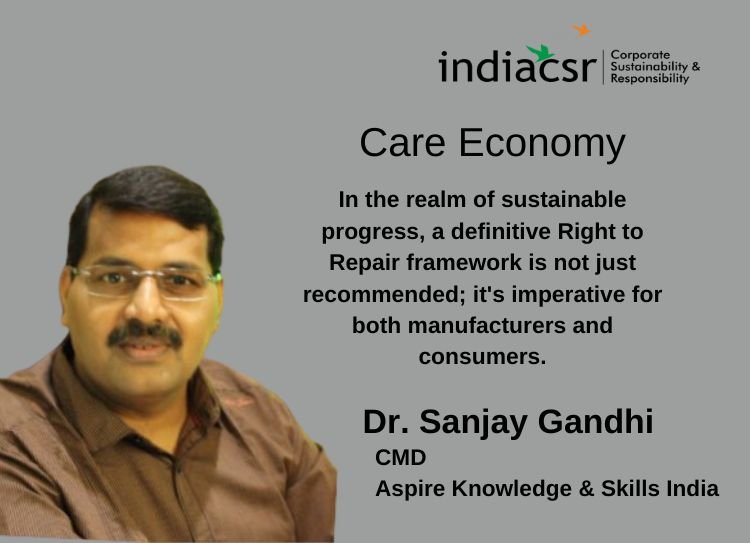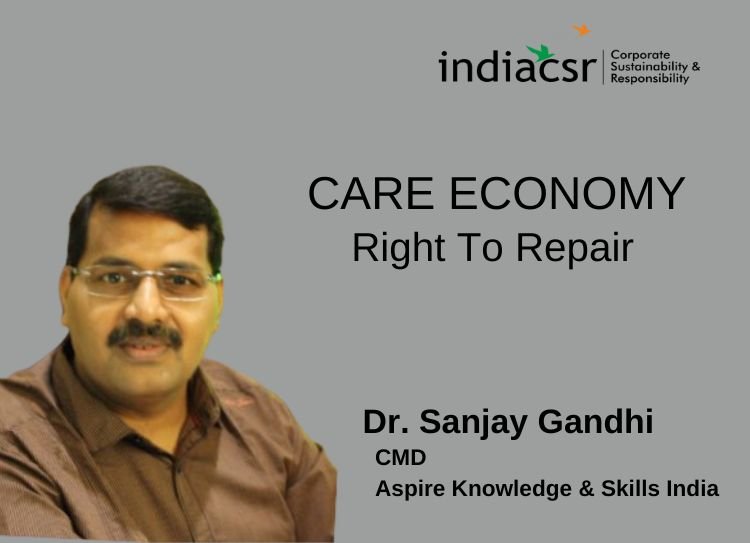A World Built on Repairs and Care
By Dr. Sanjay Gandhi
Resources, whether human, material, domestic and electronic goods, or otherwise, require care. India must emphasize maintenance, reuse, and repair in its production-centric economy, especially given its growing population. The care economy in our is largely informal, underpaid, and undervalued. At first glance, the Right to Repair (RTR) movement, advocating for the autonomy to mend our belongings, seems miles apart from the Care Economy, which encapsulates everything from childcare to eldercare. However, a deeper dive into both these spheres reveals a significant overlap in their core values and objectives: sustainability, autonomy, and fostering a sense of community.
Both the Right to Repair (RTR) and the care economy have implications for environmental sustainability, social justice, and economic development. RTR can reduce e-waste, save resources, and create new opportunities for entrepreneurs and workers in the repair sector. The care economy can enhance human capabilities, reduce inequalities, and support social cohesion.
The right to repair in India is a step toward achieving a circularity that reduces waste and resource consumption. India generates about 3.2 million tonnes of e-waste annually, which poses serious environmental and health risks. Moreover, many consumers face difficulties in repairing their products due to the lack of availability of genuine parts, instructions, or authorized service centers from manufacturers.
Repairing our Belongings, Repairing our Planet
Planned Obsolescence and the Drive for Change
Manufacturers deliberately design products that will become obsolete within a short span. This tactic forces consumers into an unending cycle of purchasing. The Right to Repair movement is pushing back, seeking transparency and accessibility from manufacturers and emphasizing the environmental costs of this endless consumption.
Reaping the Rewards of Repair
- Reduced Environmental Impact: Fewer discarded gadgets means less electronic waste.
- Boosting Economic Activity: Repair shops and services foster local businesses.
- Amplifying Consumer Choice: Empowerment to repair or choose a repair service.
- Extending Product Lifespan: The longevity of products is directly proportional to the money saved.
- Global Recognition: Countries like the USA, France, Netherlands, Belgium, Italy, and potentially India, have recognized and acted upon these benefits, integrating Right to Repair laws into their legislations.

Right to Repair: Empowering consumers
However, RTR can also empower consumers to extend the life of their products and save money. It can also create new opportunities for entrepreneurs and workers in the repair sector. In fact, India already has a culture of reuse and repair that can be leveraged for RTR. Therefore, it is important to develop a comprehensive RTR framework that defines the scope, standards, and responsibilities of manufacturers and consumers.
Melding Repair with Care: A Sustainable Future
The essence of the Right to Repair movement and the care economy is an inherent respect — respect for the environment, for products, for skills, and for each other. Both advocate for a world where value isn’t determined by the newest purchase or outsourcing essential care, but rather by the longevity of products and the depth of interpersonal relationships.
Synergy between Movements: How Right to Repair Complements the Care Economy
I truly believe that the Care Economy and the Right to Repair are closely linked by their common goals of promoting human well-being and environmental sustainability. Both can contribute to reducing poverty, inequality, and carbon emissions in India. Both can also benefit from policy interventions that support their development and integration.
Understanding the Underlying Principles
At the heart of both the Right to Repair and the Care Economy lies a deep appreciation for sustainability and conservation. Just as fixing a broken device conserves resources and extends its life, the Care Economy looks to nurture and preserve human lives, ensuring everyone can thrive irrespective of their age or health condition.
The Economic Paradigm Shift
However, the care economy also has the potential to create millions of decent jobs, reduce inequalities, and enhance human capabilities.
From Consumption to Preservation
The mainstream economy thrives on consumption. However, both these movements challenge this norm by promoting preservation — be it of products or human well-being.
Local Economies Benefit
Repair shops often bolster local economies, and similarly, when families can access local caregiving services, the money stays within the community, strengthening it.
Job Creation and Diversification
A drive towards repair and maintenance can create new jobs and skill requirements. Similarly, the Care Economy, with the right support, can generate millions of new roles, from caregiving to therapy and counseling. According to an ILO report, investing in the care sector can produce 11 million jobs in India by 2030.
Interconnected Outcomes and Shared Lessons
Environmental Implications
A repair culture drastically reduces waste, lowering the environmental burden. Similarly, a robust Care Economy, by focusing on community-based solutions, can minimize the carbon footprint associated with larger care institutions and related infrastructures.
Empowerment and Autonomy
The Right to Repair movement emphasizes individual autonomy over possessions. Similarly, the Care Economy can foster personal agency, enabling people to choose their preferred care solutions, be it home-based eldercare or community-centered childcare.
Collaborative Solutions
Both movements emphasize the need for collaboration. While Right to Repair necessitates manufacturer-consumer collaboration for accessible repair solutions, the Care Economy requires a multi-pronged partnership among governments, communities, and families.
A Collective Way Forward
As the world grapples with challenges like resource depletion and an aging population, the synergy between the Right to Repair movement and the Care Economy provides a beacon of hope. By integrating the principles of both, societies can adopt a holistic approach that values preservation, sustainability, and care.
By developing policies that balance the interests of different stakeholders and promote the positive impacts of both sectors, India can achieve a more circular, inclusive, and resilient economy.
By fostering a global culture that values fixing over discarding, and nurturing over neglecting, we have a genuine chance to redefine growth and prosperity. The intertwined futures of the Right to Repair and Care Economy movements not only shine a light on the pressing issues of today but offer solutions for a better, more inclusive tomorrow.
By recognizing the interplay between these two realms, we can start to envision a world where taking care of our belongings and each other becomes second nature. As the momentum for these movements grows globally, they offer a roadmap for a more equitable, sustainable, and interconnected future.
The transition to a care, repair, and reuse economy will not be easy, but it is essential if we want to create a more sustainable and equitable future for all. By working together, we can make this transition a reality.
Also Read: Right To Repair: USA’s Journey Towards Consumer Freedom – India CSR
(Copy Right @ India CSR)

















